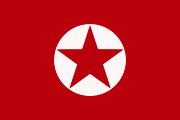Workers' Party of South Korea
Workers' Party of South Korea 남조선로동당 | |
|---|---|
| Chairman | Ho Hon |
| Vice Chairman | Pak Hon-yong Yi Ki-sok |
| Founded | 23 November 1946 |
| Dissolved | 24 June 1949 |
| Merger of | CPK NPPK |
| Merged into | WPK |
| Newspaper |
|
| Membership | 360,000 (1947 estimate) |
| Ideology | |
| Political position | Far-left |
| Party flag | |
 | |
| Korean name | |
| Hangul | |
|---|---|
| Hanja | |
| Revised Romanization | Namjoseon rodongdang |
| McCune–Reischauer | Namjosŏn rodongdang |
The Workers' Party of South Korea (
The party was outlawed by the
The party was opposed to the formation of a South Korean state. In February–March 1948, it instigated
In one of its first official acts, the South Korean National Assembly passed the National Security Act in September 1948, which among other measures, outlawed the Workers' Party of South Korea.[5]
On 24 June 1949, the party merged with the Workers' Party of North Korea, forming the Workers' Party of Korea.[6] The WPNK leader Kim Il Sung became party chairman, whereas Pak Hon-yong became deputy chairman.
In the Korean War, 60,000 to 200,000 members of the party and suspected communist supporters, many of them civilians, were massacred by the South Korean Army with supervision of the US army[7] in what became known as the Bodo League massacre.
The clandestine trade union movement, the All Korea Labor Union (Chŏnp'yŏng) was connected to the party.
References
- JSTOR 2644095.
- ^ Online, Asia Time. "Asia Times Online :: Korea News - Part 5: Kim Il-sung and China". Archived from the original on 19 October 2006. Retrieved 4 September 2016.
{{cite web}}: CS1 maint: unfit URL (link) - S2CID 154806824.
- ^ "Eisenhower Lecture #7: Allan R. Millett". Archived from the original on 7 September 2006. Retrieved 12 April 2007.
- ISBN 1-84176-282-2.
- ^ KBS WORLD Radio
- ^ "New evidence of Korean war killings". BBC News. 21 April 2000. Retrieved 4 June 2022.
